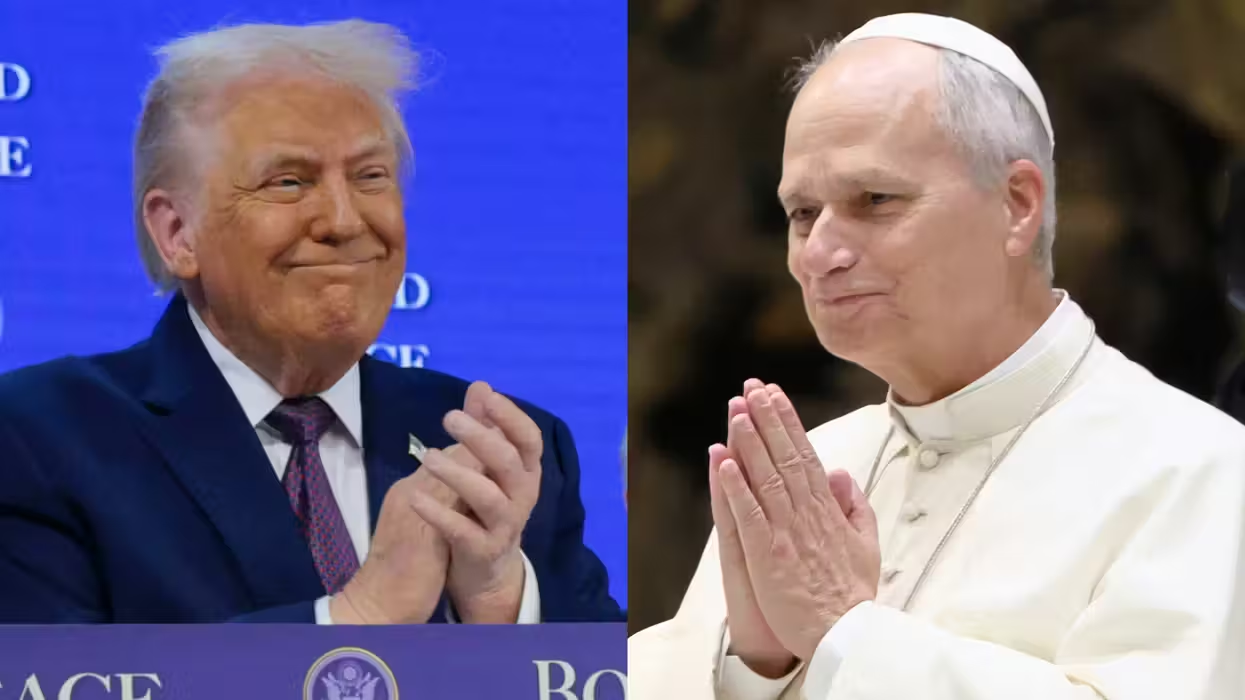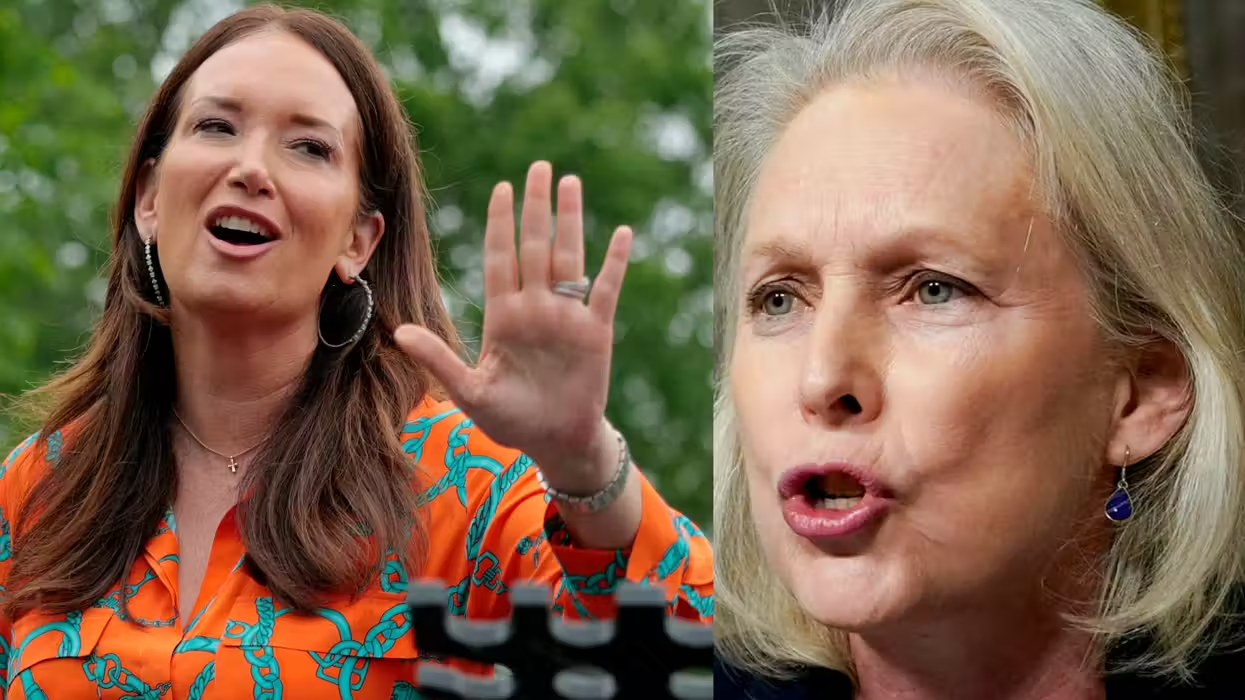
© 2026 Blaze Media LLC. All rights reserved.
With Young Voters, Republicans Must Give Up on Social Issues or Give Up Altogether, Poll Data Suggests
December 05, 2012
"The economic issues Mitt Romney hammered on were nowhere to be foun..."
 Editor’s Note: This is the fourth in a series of articles examining what went wrong for the Republican Party in the 2012 presidential election and where the GOP goes from here. Please visit our special section GOP: What Next? to follow the series of stories and find related content.
Editor’s Note: This is the fourth in a series of articles examining what went wrong for the Republican Party in the 2012 presidential election and where the GOP goes from here. Please visit our special section GOP: What Next? to follow the series of stories and find related content.
--
If there is any group that is absolutely necessary for Republicans to win, it is the so-called millennial generation.
Millennials -- typically considered to be anyone born in the 1980s or since -- are on track to exceed the baby boomers in terms of sheer numbers, and are already engaged with politics at a level sufficient to make them a serious force.
This generation of voters is an elusive target for the GOP, as polling data shows that President Obama was able to retain 60 percent of the vote from Americans aged 18-29, even in spite of his economic failures arguably hitting them the hardest. How could this happen? Because almost none of the cultural cues currently most relied upon by the Republican party resonate at all with this generation.
Perhaps the most obvious way in which this disconnect manifests itself is on questions relating to religion. According to a Gospel Coalition poll taken in April of this year, 25 percent of millennial voters list themselves as having no religion at all.
The decline in religious affiliation is especially strong among those who were raised catholic or mainline protestant, while black protestants and white evangelicals have managed to retain most of their following. Under a quarter (23 percent) of millennials believe the Bible should be taken literally, with a slightly higher number (26 percent) believing the Bible is the word of God, but not a literal document. Both numbers are dwarfed by the number of millennials who believe the Bible is simply a document written by men with no divine inspiration whatsoever (37 percent).
Another way that millennials differ from previous generations is that they look at practically everything from an entrepreneurial or business standpoint, with a mentality that writer and critic William Deresiewicz has described as "Generation Sell":
Perhaps a bit of each, but mainly, I think, something else. The millennial affect is the affect of the salesman. Consider the other side of the equation, the Millennials’ characteristic social form. Here’s what I see around me, in the city and the culture: food carts, 20-somethings selling wallets made from recycled plastic bags, boutique pickle companies, techie start-ups, Kickstarter, urban-farming supply stores and bottled water that wants to save the planet.Today’s ideal social form is not the commune or the movement or even the individual creator as such; it’s the small business. Every artistic or moral aspiration — music, food, good works, what have you — is expressed in those terms.[...]
It’s striking. Forty years ago, even 20 years ago, a young person’s first thought, or even second or third thought, was certainly not to start a business. That was selling out — an idea that has rather tellingly disappeared from our vocabulary. Where did it come from, this change? Less Reaganism, as a former student suggested to me, than Clintonism — the heroic age of dot-com entrepreneurship that emerged during the Millennials’ childhood and youth. Add a distrust of large organizations, including government, as well as the sense, a legacy of the last decade, that it’s every man for himself.
This entrepreneurial drive is tempered by a lack of financial awareness, with many millennials having no idea how to construct a budget, and not understanding the mechanisms of credit scores. Needless to say, this filters into their politics.
Perhaps the biggest difference between millennials and older generations is their absolute immersion in technology. This is a generation for whom the internet is practically a second language, Twitter, Facebook and other social networking sites are the equivalent of "See Spot Run" in terms of web savvy. They get their news from the internet (supplemented in some cases with comedy programs like the Daily Show), and also interface with the world completely through the internet. The Fiscal Times offers some clarification on this point:
This has led to some uninhibited spending by young people. According to a study by PricewaterhouseCoopers, Gen Y shoppers will be a big factor in leading the economic recovery, since this generation has a greater willingness to spend, especially on new technologies. "Gen Y is accustomed to instant gratification and demands the latest and greatest gadgetry; a tech lifestyle is a need, not a want," the report says.
This "technology is a need, not a want" thinking argues especially strongly for a technologically savvy Republican outreach strategy where young voters are concerned, since for young voters, inability to interface with a party through technology would be the equivalent of a campaign having no mailing address or no phone number for older generations. It's simply a sign that the group in question doesn't exist in a functional way.
And then there is the question of inter-generational conflict. In this respect, the millennial generation is notable insofar as it has a very antagonistic relationship with the previous holder of the title of largest generation in America - namely, the baby boomers. And there is no love lost on the boomer side of the ledger either. Again, the Fiscal Times reports:
Feelings of desperation and even anger among the millennial generation (those born between 1981 and 2000) towards their baby boomer (those born between 1945 and 1964) managers are common among young job seekers according to experts. The recession has put a damper on their career goals—55.3 percent of those 16-29 were employed in 2010, down from 67.3 percent in 2000, and 5.9 million Americans between 25 and 34 lived with their parents, up from 4.7 million before the recession, according to recent census data.[...]Generational conflicts have always been present in the office, but experts say baby boomers and Generation Y in particular have characteristics that can clash. Shantay Bolton, an organizational consultant in Huntsville, Alabama, says that Gen Y tends to have a different set of work-life values than boomers. While boomers tend to be work-obsessed, millennials are demanding flexible schedules that allow them to pursue an active life away from the office. Boomers tend to like autonomy, while millennials want more direction and enjoy collaboration. Bolton says that GenY perceive boomers as “micromanagers” perhaps because boomers tend be competitive, logical, and efficient. She acknowledges that many younger generation workers are frustrated by the poor job market and worry that boomers who delay retirement are making the situation worse.[...]
Almost 25 percent of HR professionals reported some generational conflict in the workplace according to a 2011 poll by the Society for Human Resource Management (SHRM). Forty-seven percent of younger workers complained that older managers were resistant to change and had a tendency to micromanage. About 33 percent of older respondents griped that younger workers informality, need for supervision, and lack of respect for authority were problematic.
This outsized generation gap will present special problems in the future as issues near and dear to millennial voters' hearts - for instance, the increasingly unsustainable student debt burden borne by many of them - clash with boomer fiscal priorities on issues like entitlements. Given that increased spending on both of these areas would be massively unsustainable, a fiscal generational tug-of-war may apply to spending, and with Democrats wedded to Medicare and Social Security by their ideology, Republicans are naturally poised to pick up the side of disillusioned young voters who would like to see their elders sacrifice a little so that they have a chance. This latter instinct may explain the willingness of many young people to support otherwise ideologically counter-intuitive candidates like Texas congressman Ron Paul.
However, if Republicans are to see and act on the advantages offered by the ins and outs of millennial culture, they first will have to convince millennials to trust them. And in order to do that, they will need to know where they diverge from younger voters politically, and do something to remedy that.
Economic issues
One of the few nuggets of good news for Republicans where young voters are concerned is their outsized entrepreneurial spirit. However, that does not appear to naturally translate into politics. A Pew study previously reported on by TheBlaze showed that young voters favored socialism over capitalism, with 49 percent of young voters having a positive impression of the label "socialism," and 43 percent having a positive impression of the label "capitalism."
However, even here, there is a spot of hope for the GOP -- young voters also had positive reactions to the word "libertarian" and other polls have shown them having better reactions to phrases like "free enterprise." Moreover, young voters may show affection for socialism due to their relatively low position on the income scale at this point in their lives.
But - and this is a big but - Republicans absolutely must not read this last fact and conclude that young voters will "grow out" of their liberal politics. Scientific studies are at best inconclusive on this effect, and more to the point, young people have only had one (poor) experience with Republican policies. To quote one young blogger, "We're not old enough to remember any kind of Republican other than Bush. What are we supposed to think?"
An attitude like that is not going to change just because of economic circumstances - actual proof that Republicans care about young peoples' issues and can govern in a way they would find acceptable will be required.
Granted, this attitude to the Bush administration is not universal. The youngest millennials don't even remember Bush. For them, Obama is the earliest example of a President they've seen. And judging by the first raft of poll results, they're less-than-impressed:
But the polls also hint at a “schism” between those who weren’t old enough to vote in 2008 and their older twentysomething counterparts, said John Della Volpe, the polling director at Harvard University’s Institute of Politics.In one poll, for instance, he found that 42 percent of 18- and 19-year-olds identified as “conservative,” compared with just over one-third who said they were “liberal.”
By comparison, those proportions were nearly flipped for 22- to 24-year-olds — 39 percent said they were “liberal,” and a third called themselves “conservative.” It was much the same for older twentysomethings.
Nevertheless, most millennials hold fiscally liberal positions and trust Democrats far more than Republicans. Still, given the entrepreneurial spirit, affection for libertarianism, and (in the case of younger millennials) emergent fiscal conservatism of young voters, if the Obama administration fails to improve over the coming four years, it may well end up discrediting fiscal liberalism among young voters. This has already been the case with white millennials, who went for Romney over Obama by seven points, though as with most age groups, minorities in the millennial generation are more liberal than their white brethren. This simply argues for better inclusion efforts on the part of the GOP both in terms of young voters generally and in terms of minority voters specifically.
The ambivalence of the young on the question of economic issues is the comparative good news for the GOP. Their attitude on social issues, on the other hand, is decisively against Republicans. Moreover, as we showed in our earlier article "7 Reasons Why the GOP Should be Worried," young voters cast their votes on social issues first and foremost.
The findings in the poll by the Gospel Coalition reveal the general refusal of young people to entertain Republican stances on issues like gay marriage and (to a lesser extent) abortion:
• Millennials' feelings toward present-day Christianity are fairly ambivalent. Approximately three-quarters (76%) of younger Millennials say that modern-day Christianity "has good values and principles" and 63% agree that contemporary Christianity "consistently shows love for other people." On the other hand, nearly two-thirds (64%) say that "anti-gay" describes present-day Christianity somewhat or very well and more than 6-in-10 (62%) also believe that Christianity is "judgmental."• A majority of college-age Millennials say that abortion should be legal in all (24%) or most cases (30%). More than 4-in-10 say that abortion should be illegal in most (28%) or all cases (16%). Roughly 6-in-10 (59%) believe that at least some health care professionals in their community should provide legal abortions.
• Millennials are nearly evenly divided over whether sex between two adults of the same gender is morally acceptable (48%) or morally wrong (44%). But nearly 6-in-10 (59%) of college-age Millennials favor allowing same-sex marriage, compared to 37% who are legally opposed.
The social liberalism of young people extends even to young Republicans, though to a lesser degree. Over the past eight years, the percentage of young Republicans who support full same sex marriage rights has grown from 28 percent to 37 percent. A Facebook group exists called "Young Conservatives for Freedom to Marry." It has 5,920 "Likes." Nationwide, between 59 and 66 percent of young voters (depending on the poll) support legalizing same sex marriage. In some swing states, this number is even higher. Abortion follows a similar trajectory, with 65 percent of young voters believing it should be legal most of the time, or all of the time.
The passion of young people on these issues also outstrips their commitments on other fronts. TheBlaze's Benny Johnson confirmed this when he interviewed young voters in Boston on Election Day of this year:
“Women’s rights”, “gay marriage”, “planned parenthood”, “social welfare” rang out time and time again. The economic issues Mitt Romney hammered on were nowhere to be found — these voters were participating in an alternate election, one based on the social issues hand-crafted by team Obama. Without any specifics, but in full faith, these young voters stood, ready to cast their sacred ballots for the incumbent.
The attitude was also characterized by National Review's Rich Lowry as "Let Them Eat Gay Marriage," a riff on Marie Antoinette's "Let Them Eat Cake." And indeed, based on this year's election results, young voters appear prepared to deny themselves jobs and functional financial futures over social issues like gay marriage and access to contraception.
Not all Republicans are incapable of accepting this reality - in fact, some Republicans would arguably qualify as heroes to these socially liberal youngsters. The most obvious example would be former Bush Solicitor General Ted Olsen, who is currently leading the legal battle to get California's anti-gay marriage constitutional amendment known as Proposition 8 thrown out in court, even bringing his case to the Supreme Court. Moreover, the bills legalizing same sex marriage this past election cycle were all passed with Republican support. Several Republican commentators and lawmakers have already come out in favor of the practice.
However, these overtures can only work if the wider party accepts the fundamental shift on this issue - and on social issues generally - that has taken place not only among young voters, but nationwide.
Want to leave a tip?
We answer to you. Help keep our content free of advertisers and big tech censorship by leaving a tip today.
Want to join the conversation?
Already a subscriber?
more stories
Sign up for the Blaze newsletter
By signing up, you agree to our Privacy Policy and Terms of Use, and agree to receive content that may sometimes include advertisements. You may opt out at any time.
Related Content
© 2026 Blaze Media LLC. All rights reserved.
Get the stories that matter most delivered directly to your inbox.
By signing up, you agree to our Privacy Policy and Terms of Use, and agree to receive content that may sometimes include advertisements. You may opt out at any time.






